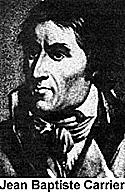L'Armee Pyrenees Orientales
The advance of General Dugommier over the Pyrenees had been held up by a lack of supplies and equipment but due to the efforts of General Labarre and Representant du Peuple, Soubrany, they have been able to push on into Catalonia. Dugommier, however, found his way to Figueras blocked by a fortified Spanish position, including 90 redoubts, at St. Laurent de la Mouga. Determined not to let his offensive stall, a night attack was planned for 26 Brumaire, and news of this has reached Paris.
The assault was made with the Division of General Augereau on the right, and that of General Perignon in the centre. To draw attention away from the main attack General Victor was to launch a feint attack on the left of the position. The fighting was fierce, and whilst Augereau in particular met with some success, the Spanish Line held. The battle continued the next morning, but General Dugommier was killed when a Spanish shell exploded on the summit of "La Montagne Noire" whilst he was surveying the Spanish positions.
General Perignon assumed command, and with true revolutionary zeal and eager to avenge the death of their beloved General, his troops moved forward once again. Storming a redoubt containing 25 guns, the attack was so fierce that 3 Spanish Generals, including their Commander - General Count La Union were killed. This took the heart out of the Spaniards who were soon fleeing in panic.
Figueras finally surrendered to Perignon on 7 Frimaire, and this victory will no doubt end hostilities on this front. Dugommier will be long remembered as a true hero of the Revolution, successfully clearing the British out of Toulon, and then driving the Spanish invaders back onto their own territory, and decisively defeating them.
 Arrestation et Execution de Carrier
Arrestation et Execution de Carrier
Whilst the fighting in Spain was at its height, here in Paris, Citizen Laffond, Adjutant of the Guard at the Convention was given instructions to effect the arrest of Jean Baptiste Carrier. Accompanied by an Officer of the Gendarmerie and detachment of the Guard, and the necessary bailiff they entered the house of Carrier at 2 in the morning.
Carrier was found in his bed, and having been read details of the summons, was invited to get up. Feigning modesty Carrier demanded that the curtains be drawn around his bed. Laffond refused insisting he dress in front of his men. Carrier protesting loudly at this, produced a twin barrelled pistol from beneath his bed and pointed it into his mouth. Initially taken aback, Laffond, threw himself at Carrier and managed to disarm him although he himself was not armed. Constrained lest he attempt to take poison Carrier was taken to prison. He continued to harangue Laffond with offers of his parole, and even demanding an airy room at the Concierge with a view of the mountains, as would be appropriate to a Representant du Peuple.
As Representant du Peuple at Nantes, he became notorious when he supplemented the guillotine with "vertical deportations". Holes were cut in the sides of barges, over which planks were temporarily nailed. The barges were then crammed with prisoners, the planks removed and the barges sunk. Any who tried to escape were sabred in the water. This was part of the total war he waged in the Departement Loire Inferieure and against the rebels in the Vendee.
Indicted as the last of the Thermidorean terrorists by the Convention, he was executed at the Place de Greve.
D'Hiver
Winter has come early to Paris, and to add to the food shortages, temperatures are as low as any can remember. The rivers have become icy expanses and Parisians have been able to skate on the Seine. Many roads are impassable and people are advised to keep to the shelter of their homes. Wolves have even been sighted scavenging close to the towns.
Pichegru
Whilst Frances enemies retreat through the winter storms, General Pichegru has taken advantage of the freezing weather. His army has taken advantage of the opportunity offered with the freezing of the Meuse to cross in force and advance on Amsterdam whilst the natural defences of Holland are paralysed. Deputies in the Convention are holding talks with envoys from the Dutch Stadtholder, but it seems unlikely they will accept anything less than an advance to Frances natural borders, whist our Armies are making progress.
Back to Table of Contents -- First Empire #21
Back to First Empire List of Issues
Back to MagWeb Master Magazine List
© Copyright 1997 by First Empire.
This article appears in MagWeb (Magazine Web) on the Internet World Wide Web. Other military history articles and gaming articles are available at http://www.magweb.com